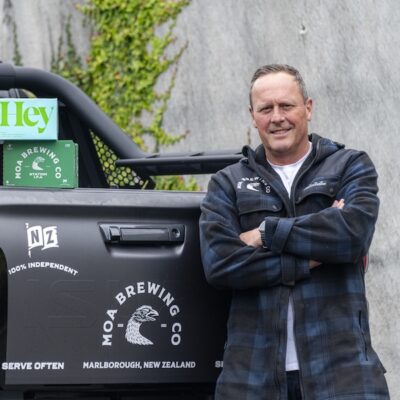Lessons from yesteryear
NZBusiness magazine began life 70 years ago as Better Business. Over the years it has seen enterprises, governments, policies and history-makers come and go. Now on these pages we celebrate our progress as a nation of business owners, and demonstrate how companies have had to overcome difficult times through initiative and sheer bloody-mindedness. And David Irving talks about the lessons we can learn from our business heritage. By Glenn Baker.
Where do you start? What do you leave out? What do you put in? Reviewing the progress of New Zealand business since 1938 is a somewhat daunting task for anyone. It is a long time – 70 years is a lifetime. Just think, people born around the time of the Second World War have witnessed an extraordinary amount of change during their lives. The very first issue of NZBusiness – then known as Better Business – seemed the logical place to begin our journey back in time. This required a visit to the Alexander Turnbull Library in Wellington – where the very early issues of Better Business were safely stored away. They are in good hands – accessing those precious first issues was not a case of simply walking in and removing them from the shelf, as you’d expect at your local library. There are procedures and protocol involved here – after all, this is where much of our national heritage is housed. Picking up that first issue was a humbling experience. While a far cry from the full colour, high resolution magazines we are used to today, its creators were clearly excited about the future of their small A5-size ‘digest’, and the service it would provide for the nation’s business owners. Fast forward 70 years and the objectives of the magazine are not hugely different, although as the world has moved towards niche products targeting specific needs, so too has the scope of the magazine’s editorial focus been narrowed to the SME sector (This is especially so under its current owner Get Ahead Publishing). A day spent at the Alexander Turnbull Library poring over the magazines from the first four decades gave me an appreciation of what it was like to live and conduct business during the war and the immediate post-war years. The global conflict had created extreme shortages of goods and raw materials, so this was a time when the now-famous Kiwi ‘No 8 wire’ can-do attitude rose to the fore. The decades after the war would also stir up a major identity crisis for this young nation as it struggled to cut free its ties with motherland England, even though it was still dependent on her for much of its export earnings. Because covering seven decades of business was such a major task, and because my own personal interest in business wasn’t to emerge until the late 1990s, I soon realised I would need to consult someone with an extensive business background and a keen understanding of where we’ve been, where we are now, and where we’re headed – from a business perspective. Someone who is a passionate advocate of the SME (small and medium enterprise) sector and has an affinity with business owners. David Irving seems the logical choice. Irving led the establishment of The Icehouse Business Growth Centre for the University of Auckland Business School in 2001 and is currently its chairman. He is also a major shareholder in Cable Bay Vineyards, a ‘community focused’ wine producer at Waiheke Island in the Hauraki Gulf, as well as adjunct professor of enterprise and management at the University of Auckland Business School. In the latter role, Irving has been a major influence in enhancing the focus around the integration between the teaching, learning and research activities of the Business School and the business community. Irving was at Heinz-Wattie (formerly J Wattie Canneries) for some 23 years, starting out as company secretary and eventually retiring as CEO and area director Australasia in 1997, and has seen first-hand how change impacts on businesses. Indeed his book It Must Be Watties highlights those tumultuous years at Watties during the 70s and 80s when the company underwent a difficult transformation to become a top-performing multi-national firm. In more recent times Heinz-Wattie has developed one of the Southern Hemisphere’s biggest and most technologically-advanced food factories in Hastings, flying in the face of the tide of local manufacturers shifting operations overseas. Defining moments I first asked Irving what he thought had been the defining moments in New Zealand’s history in regard to economic progress. His view is that there had been just four. “The first was World War Two which I wasn’t around for, but which sparked an amazing growth in demand for commodities. The second defining moment, and in Irving’s opinion, the most profound change took place in 1973 when Britain entered the European Economic Community (EEC). This meant that all existing trade arrangements virtually ceased overnight and New Zealand’s exporters were forced to look for alternative markets for their products – in particular meat, butter and cheese. This period marked the country’s first step down the path towards ‘globalisation’ – which would eventually become the world’s trading ‘buzzword’. “This was to be a massive shift in mindsets for people,” says Irving. “In a very short space of time we had to transition from order providers to service providers.” The third defining moment was to take place in 1983 when Prime Minister Robert Muldoon and his Australian counterpart Bob Hawke signed the CER (Closer Economic Relations) trade agreement. This took place at a time when New Zealand had massive import licences and tariffs (said to be the highest in the developed world) and huge cross-subsidies. It involved major adjustments by New Zealand firms to the idea of strong competition from Australia. “This period is the most vivid for me,” recalls Irving. “It was downright dangerous for our food companies, which faced the prospect of being wiped out by the size of the Australian producers. But while there was some anger from local manufacturers when CER began, in effect it opened up a whole new market opportunity. As a result of CER we had to change our whole approach to business. We suddenly had to become marketers.” His pick for defining moment number four is the economic reforms of Roger Douglas in the late 80s/early 90s – an ‘economic experiment’ which was often held up overseas as a shining example of reform, but which was to prove to have long-term ramifications. “A large number of industries failed, and it was a very interesting time for business,” says Irving. “Although living in the provinces meant we didn’t feel the same pain as Auckland, especially when the sharemarket crashed in the middle of it all.” He recalls that, as in today’s economic climate, cash was harder to raise. “Fortunately at Watties, which was then part of Goodmans, we weren’t exposed to cash issues; we were primarily concerned with bringing the company up to scratch to take on our competitors.” Irving considers Muldoon’s ‘protectionist’ era of price controls (to control inflation) as a major lesson, as it interfered to such a large degree in the performance of the business sector. “[New Zealand] would need more export volumes so we’d introduce incentives for more sheep numbers. Muldoon’s price controls brought inflation under control, but you can only manipulate the market for so long. “Extremes invite extremes,” says Irving. “The extremes of Muldoon led to those of Douglas. One was a consequence of the other. Businesses responded to Muldoon’s intervention, and as a result, didn’t do things that were recognisant of the market. For example, the meat industry invested in new plants all over the country. Post-intervention, of course, we were all carrying the burden. We couldn’t get buyers for all our products, couldn’t cover the interest costs and many companies were now in trouble. I remember Watties was the beneficiary of the Tomoana factory site for a bargain $2.5 million.” Irving remembers it as a time of over-investment in plant, equipment and land, followed by unprecedented suffering as companies and/or inventory were written off. Admirable business leadership New Zealand business people often have limited resources to call on in order to grow their firms or their market share, which typically brings out the entrepreneurial spirit. And because we don’t have the scale of operation compared to companies in other countries (we’re small firms knocking on big doors) then perseverance will always be our most valuable trait over the years. Irving has been involved with businesses of all sizes and he describes Kiwi business owners as resilient and tough – displaying a “cussedness” to achieve their goals. “That’s not to say that there isn’t a creative streak out there either – Peter Jackson is probably our best example of that. “New Zealand business owners are also, by and large, people orientated,” adds Irving. “You only have to look at the likes of Woolf Fisher, Maurice Paykel and Jim Wattie. “Jim was an amazing man who would walk the factory floor every day. He was a humble man who started the company with no money, raised finance from locals to grow the business, and held few shares in the company. Jim wasn’t in it for the money. “Jim Wattie was typical of the businessmen of that era who were basically responding to the needs of the nation – a far cry from many of todays Gen Y’ers who are in business merely to meet their personal needs.” “Having said that, I still meet owner-managers today who still have their original staff. And even if someone is no longer the most appropriate person for the job, they still keep them on the payroll. Loyalty between owner/managers and their employees is very noticeable.” When asked to name the New Zealand companies he admires the most, companies that have contributed the most to the economy over the years, Irving’s favourites are Watties, Fisher & Paykel, Montana, Zespri, Foodstuffs, Fonterra, and among the new companies, Rakon. He is sorry to see F&P shift production offshore, but sees these developments as an economic necessity. His only concern is that the design/R&D component may follow. Montana Wines, now known as Pernod Ricard, is another choice because of the company’s contribution to the wine industry and Marlborough Sauvignon Blanc – New Zealand’s signature wine. Much of this success can be credited to founder Frank Yukich, who originally took the leap of faith. “The wine industry is expected to total $1 billion in sales in 2010,” says Irving. “Which is an extraordinary achievement.” Foodstuffs, New Zealand’s second biggest company, is a favourite because of its co-operative model – “the closest you’ll get to a franchise” – and Fonterra is there because of its stunning transformation over a long period of time. Sir James Fletcher, Stephen Tindall, Angus Tait – Irving reels off the names of business leaders for whom he has a lot of respect for. Today you’ll find hundreds more names in Halls of Fame and on Walls of Fame around the country. So how does today’s crop of new owner/managers stack up against their predecessors? “It’s my opinion that owner/managers are very understated people. The country doesn’t realise how much they collectively contribute to the economy.” Irving is adamant that there is a serious lack of management capability out there – particularly amongst SME owner/managers. He suspects it has always been there, it’s just that through his Icehouse eyes it has become glaringly obvious. “Often the cost of this lack of management capability is that our successful owners will sell out to overseas buyers much earlier than if they had capable management practices. “We have to learn to keep ownership for longer. Entrepreneurs might know how to produce and sell products or services, but they must learn how to manage more – in much the same way as Jim Wattie had to back in his day. It’s a case of having to learn how to manage in order to grow. “They often don’t know how to delegate, find it hard to form and run a top team, trust others, even hold a meeting. They often see everybody as individuals – not as a collective team.” Owner/managers who manage people better, get better outcomes and greater productivity he says. It’s a tough, often lonely job, they have to learn to trust others, and they need all the help they can get, says Irving, adding that The Icehouse, through its owner-manager programmes and short courses, assists around 1200 business a year. “So you could say I’ve got a good handle on these ‘understated heroes’.” Irving believes that only around 20 percent of businesses have boards – which restricts the access to good advice. “Many business owners wouldn’t know who to put on a board anyway.” He hears ‘tragic’ stories of firms that gave away opportunities through not having the right advice, and in regards to international markets, many firms need a helping hand to be able to see the possibilities. But help is out there if businesses are willing to look for it. The Government’s new ‘Fast Forward’ initiative is an encouraging development for the food and pastoral industries especially, says Irving. Involving an investment of $700 million over the next ten to 15 years, it’s a serious attempt to foster innovation and collaboration in these vital industries and according to Irving will involve processing hubs that entrepreneurial businesses can tap into for production. NZTE’s Beachheads programme is excellent at providing international in-market resources, he adds, and today’s owner/managers are much better at tapping into them. Dealing with the downturn Meanwhile there is a matter of an economic recession to take care of, which Irving thinks could be with us for a couple of years. Its effect will vary according to sectors, and the difference with this one is that it is a world event that has rippled right through international finance markets – so almost all exporters will feel the effect. “This is very unlike the downward cycles of the Muldoon and Douglas eras which were mainly self imposed,” he says. But while the value of businesses will be impacted and the ability to raise cash will be seriously limited, Irving says those with strong balance sheets and in everyday products, provided they exercise prudent management practices, should be little affected. In the overall scheme of things, given the challenges of the past 70 years for New Zealand’s business owners, and the many economic cycles the nation has weathered – this one should be comparatively easy to ride out. Kiwi business owners have learnt to be marketers, to meet the needs of the world’s markets, and the Government has learnt to keep its hands off the business sector and allow inflation to be controlled by the interest rate regime. Now turn the pages and enjoy a stroll back through 70 years of Kiwi business support!Glenn Baker is editor of NZBusiness.





